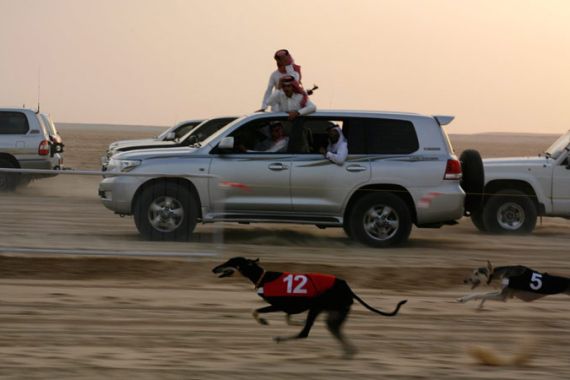In Pictures: Qatar’s hunting games
Photographs of a desert hunting competition that dates back centuries in the Gulf region.

Doha, Qatar – In a booming oil- and gas-rich country where foreigners outnumber citizens almost five to one, Qataris struggle to keep the traditions of their bedouin culture alive. For thousands of years in Qatar, much like elsewhere in the Gulf region, many lived the life of a nomad – travelling the arid land and hunting prey along the way. In the barren openness of the Gulf desert, hunters learned to keep and train animals with the ability to pursue fast-moving prey.
Falcons and Salukis were two of these animals, and today they’re kept as pets to take part in competitions, such as the third annual International Falcon and Hunting Festival in southeastern Qatar.
Keep reading
list of 4 itemsEvacuation orders issued as wildfire grows near Canada’s Alberta oil patch
Energy summit seeks to curb cooking habits that kill millions every year
Thousands evacuate as wildfire grows ‘dramatically’ in western Canada
The festival’s main competitions involve the keeping and training of falcons, or falconry, a practice originating thousands of years ago in Asia, which later spread to Europe and around the globe. Today, wild falcons can be found on every continent (save Antarctica), but only certain species are able to be kept and trained as pets.
Falconry is a delicate practice, and experts say the predatory birds – known for their dive speeds of up to 300kph (185mph) and acute vision that allows them to see prey as far as two or three kilometres away – must regularly be allowed to fly and hunt.
The festival’s other main competition involves Salukis, a hound native to the Gulf and other desert areas in the region. Dogs are not a common site in a region where they are often considered unclean in Islam, and when they are kept, it is usually as guard dogs outside homes. However, in the Gulf it is common for people to keep Salukis as pets and companions on trips to the desert.
Centuries ago the Saluki would have accompanied camel-riding travellers and hunted wild gazelles. In today’s competitions, a young gazelle is suspended from the back of a 4×4 vehicle and chased by heats of up to 15 dogs at a time.
Follow Matthew Cassel on Twitter: @justimage